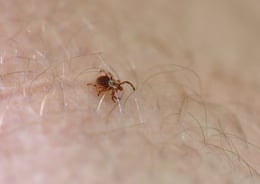
For my friends and family, camping is a favorite pastime during the summer months. Every weekend brings a new adventure at a different campground. While camping is relaxing and enjoyable, one must take precautions against tick bites.
Tick-borne disease, such as Lyme disease, has become common in the United States. While reported cases of Lyme disease date back to 1978, it stumped the medical community until 1981. A vaccine was developed but was then discontinued due to lack of use.
While not everyone experiences the same symptoms, here are some early signs of the disease.
- A red circular rash that extends out from the site of the bite
- Facial palsy
- Pain in muscles, joints, and tendons
- Heart palpitations and dizziness
- Flu-like symptoms that may include headache, fever, and overall body soreness
If left untreated, the disease will progress and the symptoms may get worse.
Tips to prevent tick bites
1. Survey your campsite – Before you head outdoors, look at your campsite and surrounding areas. Ticks love wooded and grassy areas. If you can, trim or cut long grasses.
2. Treat your camping gear – There are products that can be sprayed onto your gear that can kill ticks when exposed.
3. Buy a repellant that contains DEET – The Centers for Disease Control and Prevention recommends using repellents that contains 20% or more of DEET. If using a repellant with DEET, please carefully follow product directions, especially when applying it on children.
4. Check the temperature – Depending on the temperature and the amount of shade, clothing that covers most of your skin may be an option. If wearing such clothing, consider using rubber bands to keep jackets and pants cuffs close to your body.
5. Don’t forget your pets – Check your pets each day. Also, talk to your veterinarian about products that can be used to protect them.
6. Consider the time of year – If you own a wooded property, consider spraying several times a year. Repellant is inexpensive, and according to experts, should be used in May, June, and October. If you have more questions, talk with your local health department or agricultural officials.
How to remove a tick safely
If you get a tick bite, it’s important to remove the tick as soon as possible. Using petroleum jelly or heat may take too long. It’s best to use a fine-tipped tweezers, pulling upward while applying steady and even pressure. Be sure not to twist while extracting the tick as that could cause it to break apart leaving remnants in your body. Once the tick has been removed, clean the area with rubbing alcohol or soap and water.
How to dispose of the tick- Put it in rubbing alcohol
- Put it in an airtight bag or container
- Flush it down the toilet
- Wrap it in tape
To learn more about the disease visit the Centers for Disease Control and Prevention (CDC).
Do you have any tips or information you’d like to share? I’d love to hear your thoughts; please share them in the box below.





